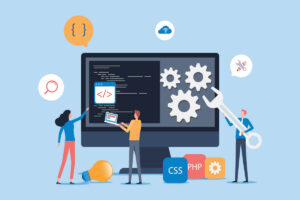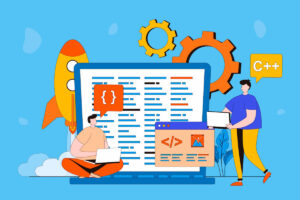As we approach 2024, the landscape of PHP development continues to evolve, with a suite of tools that have become integral to any developer’s toolkit. In this blog post, we highlight seven essential PHP development tools you absolutely can’t ignore if you want to stay on top of the industry’s best practices while ensuring you deliver secure, robust, and high-performance web applications.
The Significance of Using Efficient PHP Development Tools in 2024
Now more than ever, efficiency and effectiveness in web development are pivotal. PHP developers need the best PHP development tools at their disposal to streamline their workflow, enhance code quality, and automate repetitive tasks. This becomes especially significant in 2024 as the competition and complexity of web applications continue to increase. Utilizing these advanced tools not only aids in creating a robust product but also ensures that you are working smarter, not harder.
Tool 1: Composer – The Package Manager for PHP
Composer has become the go-to dependency management tool for PHP developers, making it easier to manage and install packages. By handling all dependencies automatically, Composer eliminates errors and inconsistencies in projects and ensures smooth collaboration among team members. Additionally, its command-line interface makes it easy to add and manage project dependencies with a simple command. With over 1 million packages in its repository, Composer gives developers access to a vast library of open-source code, saving them time and effort by not having to write every piece of code from scratch.
According to the latest Statista, PHP remains one of the top five most popular programming languages among developers.
Thus, integrating powerful tools like Composer not only streamlines development but also aligns your work with the practices of a vast and active global PHP community.
Tool 2: PHPUnit – The Unit Testing Framework for PHP
Unit testing is an essential part of the development process, ensuring that each component of the application works as intended. PHPUnit is the de facto standard for unit testing in PHP. It offers a robust framework for writing and executing tests, with features like test coverage reporting and code debugging. Additionally, PHPUnit integrates seamlessly with tools like Composer for easy setup and test execution in your project.
Tool 3: PHPStan – Static Analysis for PHP Code
Error prevention is key in software development, and PHPStan aids in this endeavor exceptionally well. As a static analysis tool, it sifts through code without actual execution, bringing potential bugs to light. Through rigorous examination, PHPStan ensures that developers catch more issues earlier in the development cycle. Its compatibility with popular IDEs like PhpStorm and integration with CI/CD pipelines makes it an indispensable tool for many developers. Moreover, PHPStan’s rules can be customized to fit a particular project or coding standard, making it even more versatile.
Tool 4: Laravel – The PHP Framework for Web Artisans
Laravel stands out as a comprehensive PHP framework designed for web artisans who require a robust toolkit for building complex web applications. With its elegant syntax, Laravel simplifies tasks such as routing, authentication, caching, and sessions. It incorporates an ORM (Object-Relational Mapper) called Eloquent for streamlined database interactions. Additionally, it features a powerful migration system for efficient database version control. Artisan, Laravel’s built-in command-line tool, automates programming tasks, while its modular packaging system includes app deployment and maintenance capabilities.
Tool 5: Symfony – The Framework for Scalable Solutions
Symfony provides a foundation for building scalable PHP applications by utilizing a set of reusable PHP components. Its focus on high performance, its flexibility, and its extensive bundle system enable developers to build applications that can grow alongside evolving business requirements. With Symfony, repetitive coding tasks are minimized, which accelerates the development process and reduces the time to market. The framework supports extensive testing with PHPUnit, ensuring that applications are reliable and secure. Additionally, Symfony’s event dispatcher and dependency injector make for a clean and extensible code architecture.
Tool 6: PHP Debug Bar – Debugging Made Easy
The PHP Debug Bar is an essential addition to any developer’s PHP development tools, promoting a simplified debugging process with its extensible user-friendly interface. It overlays on the bottom of your PHP website, providing real-time data on database queries, memory usage, and execution time without interfering with the page layout. The modular design allows for additional collectors and the ability to customize according to the project requirements. This ensures developers have clear insights into what’s happening behind the scenes, facilitating quicker resolutions to potential issues.
Tool 7: Phalcon – High-Performance PHP Framework
Phalcon sets itself apart in the realm of PHP development tools as a high-performance full-stack PHP framework delivered as a C-extension. This means it’s incredibly efficient, not just because it’s fast, but because it uses minimal resources. Unlike traditional frameworks that require files to be read on every request, Phalcon’s unique approach boosts execution speeds and reduces the overhead on the server, which is especially beneficial for high-load PHP websites. With its innovative architecture, Phalcon helps developers create powerful applications in a fraction of the time.
Tool 8: Codeigniter – Lightweight PHP Framework for Rapid Development
Codeigniter is a lightweight and straightforward PHP framework that delivers remarkable performance coupled with exceptional scalability. With its minimal footprint, it’s perfect for creating dynamic web applications without the need to adhere to restrictive coding rules. Codeigniter’s core principles revolve around simplicity, which makes it an ideal choice for beginners or those who prefer a simpler development experience. It’s also highly customizable and comes with a rich set of libraries that make building complex applications a breeze.
Conclusion: Integrating Tools for Peak PHP Development Productivity
The incorporation of these seven PHP development tools within your workflow is non-negotiable as we step into 2024. These tools not only enhance the efficiency and quality of your work but also ensure that you remain competitive in the fast-paced world of PHP development. By investing time in mastering these tools, developers can ensure that their skills remain in high demand and their projects stand out for their excellence. In the PHP development sphere, staying updated with the most effective tools is crucial. Contact us to learn more about the benefits of implementing these tools in your development process. Happy coding!












+ There are no comments
Add yours